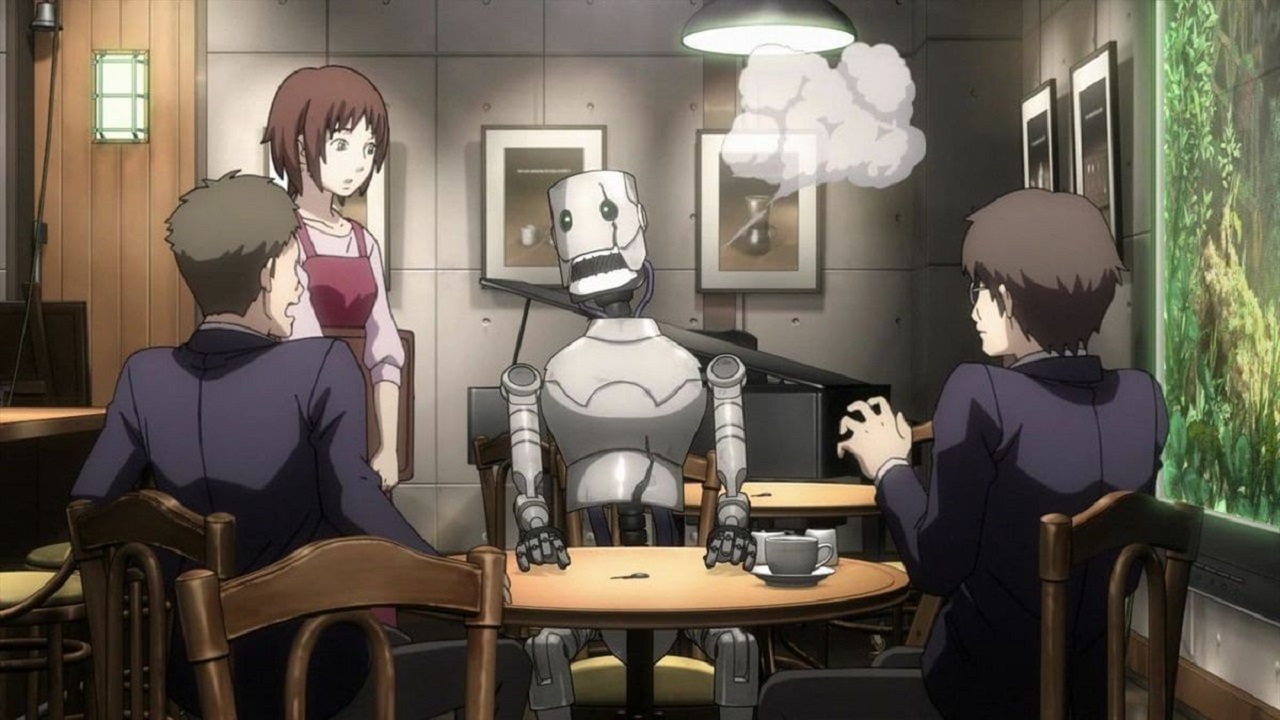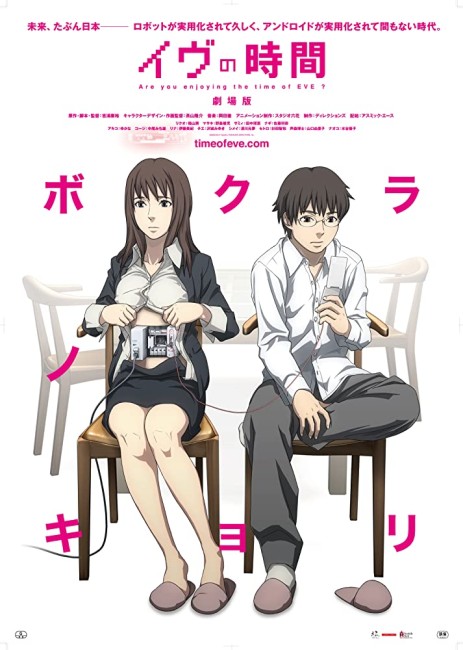(Eve no Jikan)
Crew
Director/Screenplay – Yasuhiro Yoshiura, Based on the OVA Series Created by Yasuhiro Yoshiura, Producer – Tom Nagae, Music – Toru Okada. Production Company – Asmik Ace Entertainment Inc./Directions, Inc..
Plot
In the future, the use of robots has become widespread and androids are used in many menial tasks by humans. Teenager Rikuo Sakisaka becomes suspicious after discovering unusual unprogrammed activity in the log files for his housedroid Sammy. He and his school friend Masaki Masakazu investigate, discovering that Sammy has been spending time at a cafe known as Time of Eve. Rikuo and Masaki make the shock realisation that the androids in the cafe have all switched off the halo that identifies them as an android in the outside world. The cafe’s only rule is that no discrimination be made between android and human and that nobody is allowed to ask who is machine or human. Returning to Time of Eve, Rikuo comes to befriend the patrons at the cafe, listening to their stories and reasons for coming there. Through this, he comes to an understanding of the androids and the secret lives they lead.
Time of Eve is an Anime film. It was a theatrical debut for director/writer Yasuhiro Yoshiura who had previously made the film as Time of Eve (2008-9), an OVA series of six episodes that were streamed on Yahoo Japan. The OVA seems the most logical choice for the story, which is largely construed as a series of vignettes telling the stories of the regular customers at the cafe. Yasuhiro Yoshiura had previously made the 23-minute OVA science-fiction anime Pale Cocoon (2006) and subsequently directed the full-length anime Patema Inverted (2013) and Sing a Bit of Harmony (2021).
Time of Eve is a fascinating venture into human-android relations. Like most of the more thoughtful works in these field, it pays obeisance at the altar of Isaac Asimov. Asimov’s Three Laws of Robotics are wound in and quoted throughout. In many senses though, what we have is a post-Asimovian film. Where Asimov wrote his I, Robot stories during the 1940s as logical conundrums about the loopholes and problems that might occur in the interpretation of laws to control robot behaviour, Time of Eve is about human and androids well past that and dealing with the question of how machine and human might coexist and gain an understanding of one another. Yoshiura is seeking more of a peaceful understanding than Asimov ever concerned himself with.
Yoshiura also pays homage to other robotic stories with references to Blade Runner (1982) and the RUR CPU, an allusion to R.U.R. (1921), the play by Karel Capek that invented the word ‘robot’. There is also reference made to the THX and LUH model robots, both being the lead characters in George Lucas’s dystopian work THX 1138 (1971), which was notable for its chrome-faced robot policemen.

Time of Eve has a slow pace – it is a science-fiction film that seems to consist of little more than characters sitting around a cafe drinking coffee and having polite conversations. Indeed, what we have seems more like an Isaac Asimov story by way of Jim Jarmusch’s Coffee and Cigarettes (2003). The animation style is the more traditional one of standard anime – limited movement within the frame and characters that harken back to the big oversized eyes look.
Soon in though, the stories that Time of Eve tells become fascinating. There is the android Rina, an injured bodyguard, and Koji, a housedroid who reveals that it has come to the cafe to understand its overly devoted mistress’s attachment to it, where the two have engaged in a relationship believing that the other is human and not aware that both of them is in fact machine.
Especially good is the story where a broken-down old model robot comes to the cafe and the two human boys must pretend that it is a normal human customer but are unsure whether to break the rule when it seems in danger of drinking a cup of coffee that could blow its circuits. There is an extraordinary tenderness to the scenes where it is revealed to be an abandoned robot where the memory of its time with the family that owned it has been deleted but for trace images.
Particularly moving is the final story where Masaki’s childhood THX robot comes to the cafe and we learn the heart-rendering story of how it was forbidden to speak to him by his father and how it then breaks the rules of the cafe to expose the android infiltrator come to spy on them.


